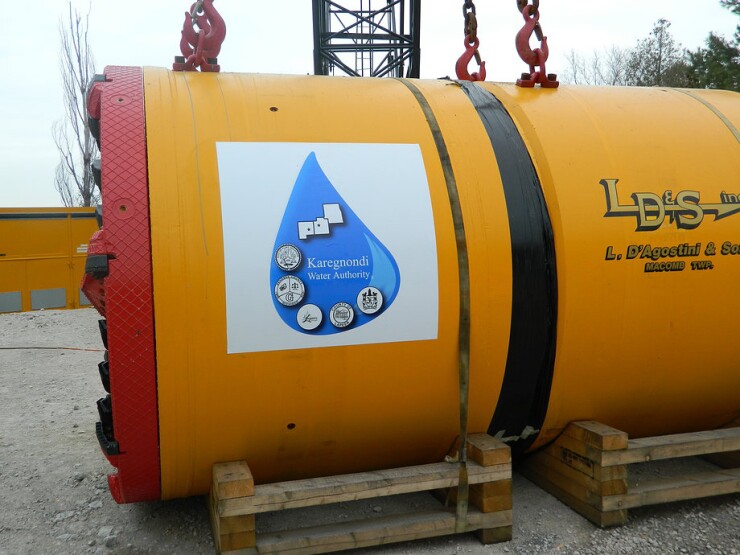Flint, Michigan's repayment pledge will remain behind an A-rated $64 million refunding issue being sold by the Karegnondi Water Authority Thursday although Flint is no longer committed to drawing water from the authority’s new pipeline.
The KWA issue will refund short-term debt sold in 2016 for the $290 million pipeline project. The bonds are secured by contractual payments to be made by Michigan's Genesee County -- which led the project -- and Flint, even though the city has entered into a 30-year contract to draw water from the Great Lakes Water Authority.

The GLWA is the successor of the Detroit Water and Sewerage Department, from which Flint had purchased water before its ill-fated decision to draw Flint River water while awaiting the completion of the Karegnondi pipeline. Flint did not treat the water properly, causing the continuing lead contamination crisis that drew national attention.
Criminal charges, including counts against former Flint leaders and a state-appointed emergency manager, were filed alleging they provided misleading information allowing the city to participate in the original Karegnondi bond sale, which received a Midwest Deal of the Year award from The Bond Buyer.
The new Karegnondi bonds – rated A by S&P Global Ratings -- are ultimately secured by Genesee County's limited-tax, full-faith-and-credit general obligation pledge. S&P rates Genesee County’s GOs A.
The $74 million Series 2016 Bonds were issued as short-term obligations to provide interim financing. Last year Flint decided not to switch to KWA and stick with GLWA in the aftermath of its water contamination crisis. Under its GLWA contract, Flint receives credit from GLWA for the portion of the debt service on the KWA system bonds that Flint pays to the issuer.
The long-term water supply arrangement between GLWA and Flint does not alter the terms of the KWA financing contract or the obligation of Flint to make contractual payments to the issuer at the times and in the amounts required.
“The city of Flint, since entering into a long-term primary water agreement with the Great Lakes Water Authority (GLWA), has reaffirmed their obligation to make debt service payments on all KWA bonds, totaling just under $300 million, which includes the $65 million series 2018 bonds,” Kevin Sylvester, deputy drain commissioner for the Genesee County Drain Commissioner's Office, said in an e-mail.
“The water services agreement between GLWA and the city of Flint provides that Flint is still responsible for making its share of the debt payments on the KWA debt,” GLWA’s chief financial officer, Nicolette Bateson, said in an e-mail. “In recognition of the monthly KWA debt service payment by Flint and other contract considerations, GLWA credits Flint’s monthly water service payment in the corresponding amount to the extent that all parties are performing under the contract.”
Flint faces unknown costs tied to numerous lawsuits stemming from the contaminated water it supplied to residents that could impact its ability to meet debt payments. On Monday the U.S. Supreme Court cleared two lawsuits filed by residents of Flint to proceed.
“The damages claimed in the lawsuits are substantial and if awarded, could have a material adverse effect on the financial position of Flint and its financial obligations pursuant to the KWA financing contract,” according to the offering statement. “Further, aggregate litigation fees and costs incurred in defending such proceedings…could also have a material adverse effect on the financial position of Flint.”
Under the contract if Flint fails to pay, Genesee County is obligated to make the payment.
JPMorgan is the lead underwriter on the deal. Miller Canfield Paddock and Stone PLC is bond counsel. S&P’s rating is supported by county’s GO pledge. S&P said that the county’s budgetary performance is strong. “We have witnessed the county outperform its budget and would expect this trend to continue over our two-year outlook period despite any increases to its pension and/or OPEB liabilities or if the county would have to step in and make debt service payments for the city of Flint with respect to the KWA debt.”
The rating agency said that the GLWA agreement also creates “additional enhancement to protect the county's liquidity position in the event that it would be responsible to pay debt service for Flint.”
The bond issue was approved last September by the Flint City Council. Sylvester said at the time that the refinancing would be done before May 1st in order to avoid increased costs associated with the original two-year borrowing.
Genesee has completed its transition to the KWA system as planned and has received regulatory approval of certain essential facilities of the Genesee System.
Flint signed off on the long-term contract with GLWA last November after months of wrangling over the plan pushed by Mayor Karen Weaver. Weaver said sticking with GLWA supplied and treated water is more affordable and eliminates the risk of another supply shift.
The contract saves the city about $9 million by locking in a more favorable rate with the GLWA.
GLWA will receive the rights to the raw water that Flint gets from the KWA.
Since April 2015, Flint has operated under a state appointed receivership transition advisory board. In January the state announced that it would hand the mayor and city council control of the city's daily finances and governmental decisions.





